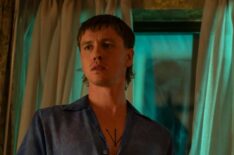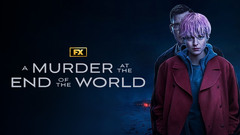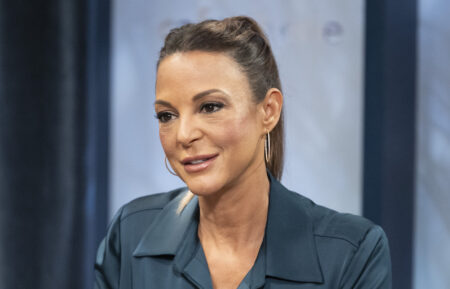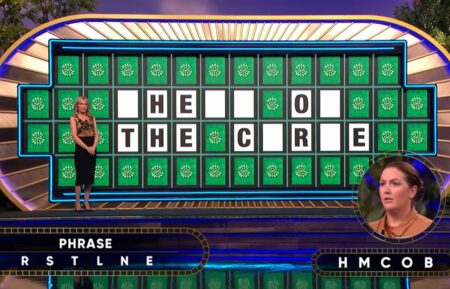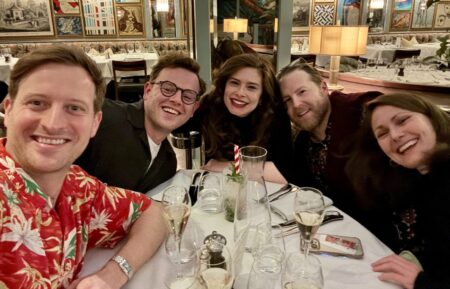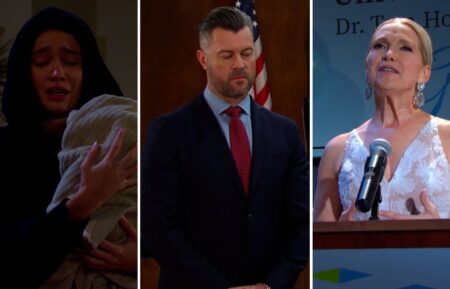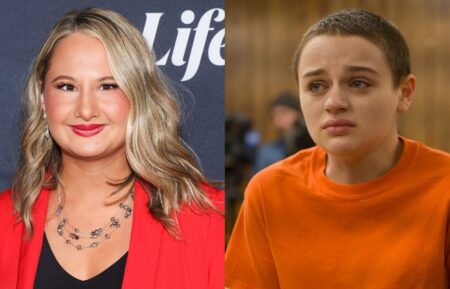‘A Murder at the End of the World’ Bosses on Killer Reveal, Plus Possible Season 2
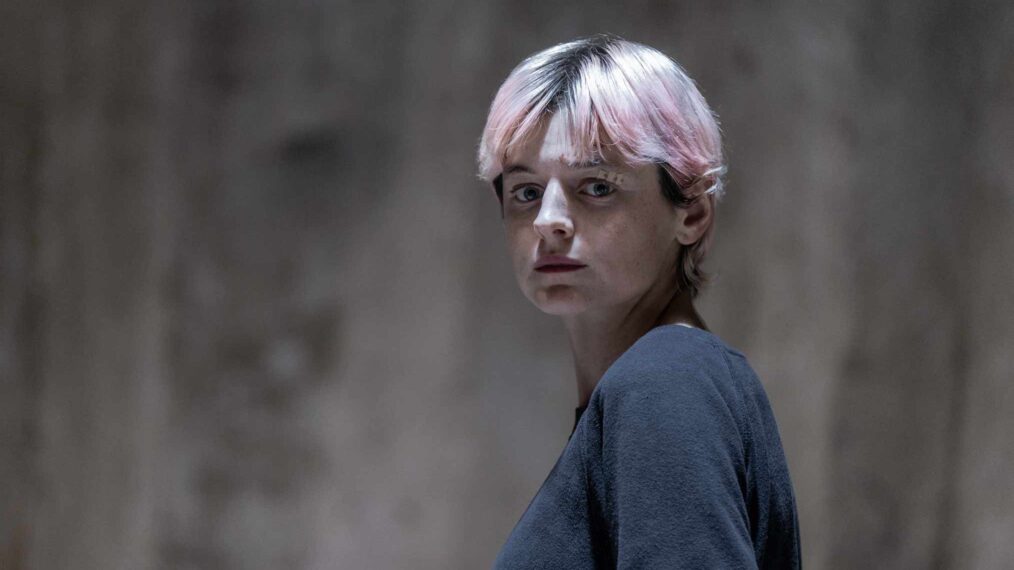
Spoiler Alert
[Warning: The below contains MAJOR spoilers for the A Murder at the End of the World finale.]
So who was behind the murders of FX‘s limited series? That’s a complicated answer.
As the A Murder at the End of the World finale (now streaming on Hulu) revealed, Zoomer (Kellen Tetlow) — yes, Andy (Clive Owen) and Lee’s (Brit Marling) son — was the one to commit the murders, at the instructions of AI Ray (Edoardo Ballerini). By the end, Darby (Emma Corrin) and Lee have destroyed the server farm, Lee (with Zoomer) has gotten away from Andy, and Darby did a reading from her new book, in which she wrote Bill’s (Harris Dickinson) ending.
Below, creators, writers, directors, executive producers, and showrunners Brit Marling and Zal Batmanglij unpack the finale. Plus, could there be a Season 2?
What part of the killer — who was behind the deaths and who was used to commit them, motive, etc. — did you figure out first and which part did you figure out last?
Zal Batmanglij: Gosh, I don’t even remember now. It all just feels like it always was. Those are hard questions to answer, but it felt right when we stumbled upon it or when it sort of bloomed.
Did you consider any other possibilities?
Brit Marling: Not really in the sense that I think we knew from the beginning that we wanted to talk about technology in a kind of nuanced, balanced way, in the way that technology is complicated in all of our lives. I have a lot of beef with my smartphone and the things that it’s doing to how I think or perceive the world, but I also do use my smartphone every day. So I think we wanted to talk about that duality a bit, and even inside exploring AI, and it felt also in order to do that, we had to talk about things on a more systemic level, that to find a single person who is to blame is sort of inaccurate for where the world is. Yes, Andy designed something from a place of fear and his insecurities and that’s a dangerous thing, but he certainly didn’t intend for the consequences that happened.
And the AI itself is not sentient. That’s just an algorithmic model that’s taking in all of history that preceded it and operating from that data set, which is often very flawed and charged by flawed ideas. And then of course, Zoomer’s really an innocent who’s caught up in that. It felt like that trifecta was a more honest way of looking at the sort of systemic ways in which we keep causing harm and passing down harm generationally potentially.
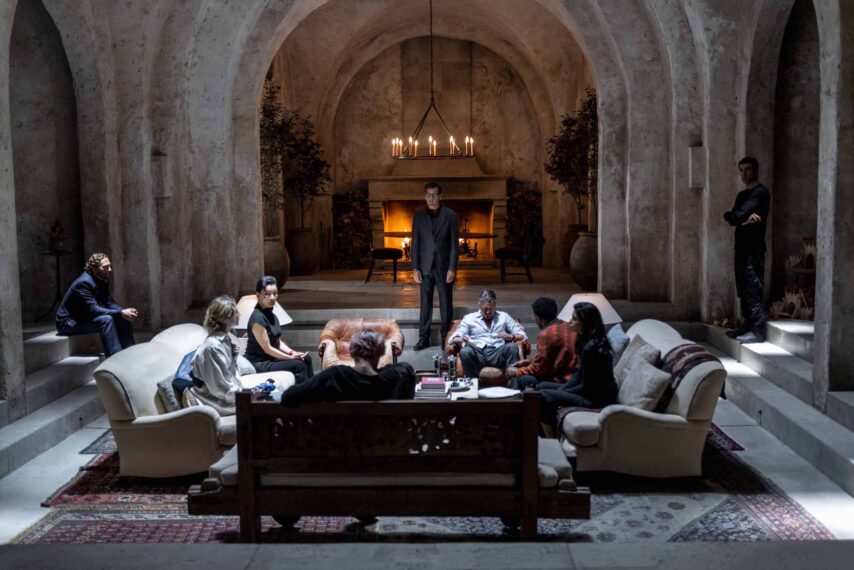
Chris Saunders/FX
Is there anyone you considered killing off and decided not to?
Batmanglij: Yeah, we tried not killing any women off. That was an intentional goal on our part. The murder mystery usually gets a lot of its fuel from sort of the eroticized murder of women, and we didn’t want that. Sian [Alice Braga] died of natural causes.
Marling: And we try even in any death to really take time to be with the death, to actually feel a passing of somebody and to give space in the narrative for their life. So it’s not like we’re just erasing people for plot machinations.
Yeah, you really feel that with Bill’s death and with Darby right outside.
Marling: I’m so glad you felt that because we took so much time constructing that scene in the writing and in the filmmaking, to try to have things be taut and thrilling, but never sort of be trafficking in, I don’t know, maybe more kind of empty violence or something.
Batmanglij: The violence of quietude is very powerful and we wanted to explore that, and whodunit really, really lends itself to that because whodunit as a genre tends to have the violence offscreen. By its nature, it’s usually offscreen. So it felt like a very natural genre to not fetishize violence.
Brit, there’s quite a bit for Lee to unpack in the finale, from the confrontation with Andy to finding out her son was used to commit murder to finally escaping with her son. You do leave a bit up in the air at the end when it comes to her, but how is she feeling at the end? Because yes, they got away, but there have to be so many complicated feelings, like how her son is going to deal with what happened. Can he comprehend what happened?
Marling: Yeah, that’s such a good question. I think the hope is that she realizes unequivocally in that moment that it’s very dangerous to keep raising her son in partnership with this man and it’s safer for her to go out on her own even though she won’t have any economic advantage or she can’t take anything with her. So it’s really heading off the grid and into the deep unknown. But I think from what she witnesses, she finally gains the courage to do that and to trust that she is a single mother out in the wilderness who is going to be able to eke a path for survival and recovery out for him.
Batmanglij: Yeah, she wanted to leave before, of course, the finale, before she knew who the killer was, but after she finds out who the killer is, she realizes there is no choice but to leave. Her instincts were right.
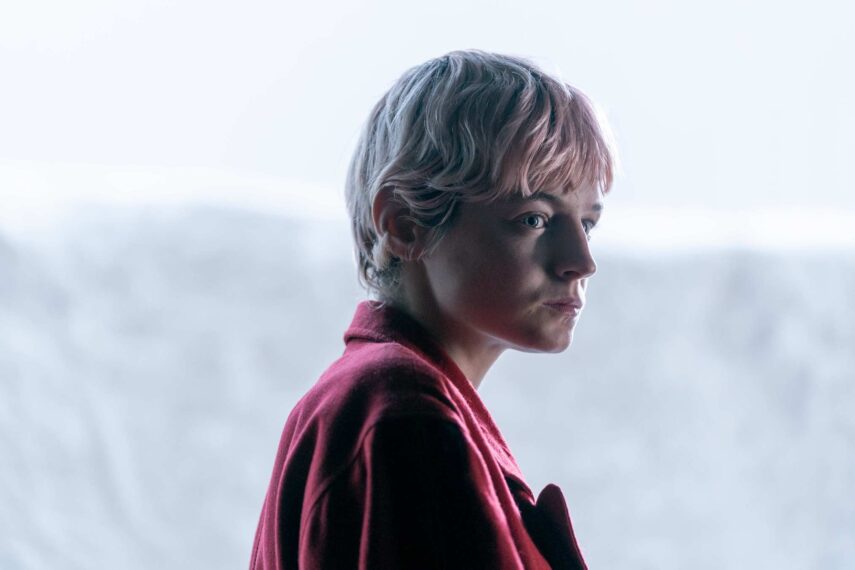
Chris Saunders/FX
I like the way that you bookended the series with Darby’s readings and using those as a way to show how she’s grown and changed as a result of her experience. But could she have gotten to the point she is with Retreat if she hadn’t been through what she was, seeing Bill again and losing him?
Marling: That’s such a beautiful question. I don’t think so. I think one of the reasons we were attracted to tell a detective story, but kind of try to remake it from the inside out — one of the things that often happens in the detective genre is that the detective sort of stays the same. It’s the case and the world that changes around them. But it was exciting to try to tell a story of a detective that needed to evolve psychologically and emotionally in order to become the kind of person that could solve the mystery at present. And I think that that felt like in some ways a metaphor for the time we’re living in. I think the sort of present things we’re up against are really demanding that we all evolve as people in order to meet the things we’re facing. It felt like a meaningful story to tell.
Because of that, how much Darby has changed in that journey, it would be really interesting to see her now solving another crime as who she is now. I know this is a limited series, but is it possible we could see more of Darby?
Marling and Batmanglij: Anything’s possible.
Batmanglij: Nothing is limited these days, right? Everything is a limited series, and everything is an ongoing series.
Is Ray gone and the concern would just be someone else making something like Ray? Or might he have found another host?
Batmanglij: That is for the world to tell us in the next couple of years.
Does this feel like a mystery and an ending where those who deserve to be held responsible and punished can’t be in the way they should be?
Batmanglij: Well, I think that’s true for the world. The people who are really responsible for much of the harm in the world can’t actually be held accountable for it. They’re smart enough not to have blood on their hands in a way that’s legible. It’s more systemic than that. It’s more like a noxious gas that doesn’t have a smell, kind of like carbon monoxide, in the sense that carbon monoxide will kill you, but you won’t even know that it’s in the air. You can’t even smell it. And I think that’s the scariest things out there.
Is there a character or relationship you especially enjoyed exploring throughout the season? Each was so different and any two characters together on screen popped so well.
Marling: It’s so nice to hear you say that. We cast this with Avy Kaufman. She’s an incredible casting director, and the parts were very distinct, and Avy worked really hard to find people from all over the world that could fit those characters. Personally, I love the dinner scene in Chapter One or the breakfast scene in Chapter Two, where you see everybody together and you really feel them all playing off of each other and the sense of suspicion roiling around. And I think there’s an incredible cast chemistry amongst everyone, and you feel that, of course, especially at the end, too.
A Murder at the End of the World, Streaming Now, Hulu
From TV Guide Magazine
How 'Countdown' Recruited Jensen Ackles to Go Full 'Die Hard'
Countdown boss Derek Haas talks creating the character around Ackles, and the cast teases the “Avengers”-like team of the crime thriller. Read the story now on TV Insider.

